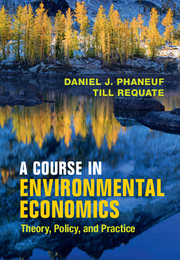Book contents
- Frontmatter
- Dedication
- Contents
- Figures
- Tables
- Preface
- Notational Conventions
- PART I ECONOMICS AND THE ENVIRONMENT
- PART II THE DESIGN OF ENVIRONMENTAL POLICY
- PART III VALUING THE ENVIRONMENT
- 14 Theory of Applied Welfare Analysis
- 15 Revealed Preference Models
- 16 Discrete Choice Models
- 17 Recreation
- 18 Property Value Models
- 19 Stated Preference Methods
- 20 Health Valuation
- PART IV THE PRACTICE OF ENVIRONMENTAL ECONOMICS
- References
- Author Index
- Subject Index
17 - Recreation
from PART III - VALUING THE ENVIRONMENT
Published online by Cambridge University Press: 27 February 2023
- Frontmatter
- Dedication
- Contents
- Figures
- Tables
- Preface
- Notational Conventions
- PART I ECONOMICS AND THE ENVIRONMENT
- PART II THE DESIGN OF ENVIRONMENTAL POLICY
- PART III VALUING THE ENVIRONMENT
- 14 Theory of Applied Welfare Analysis
- 15 Revealed Preference Models
- 16 Discrete Choice Models
- 17 Recreation
- 18 Property Value Models
- 19 Stated Preference Methods
- 20 Health Valuation
- PART IV THE PRACTICE OF ENVIRONMENTAL ECONOMICS
- References
- Author Index
- Subject Index
Summary
One of the more ubiquitous uses of the natural environment is for outdoor leisure activities. Natural features such as lakes, rivers, beaches, forests, and mountains provide the places people visit to participate in a large variety of outdoor activities. Less overtly natural areas such as local parks, trails, and designated recreation areas also provide infrastructure that facilitates spending time outdoors. In many cases these types of resources are officially designated as parks or other public use areas; in other instances they simply exist and are used by the public. In some situations access to outdoor recreation areas is rationed by markets (alpine skiing is a good example), but in most cases recreation is a non-market, open access good in the sense that entry is free (or involves only a nominal fee), and generally unrestricted. Several examples of recreation uses of the environment fitting this description were given in prior chapters; these included obvious activities such as high-altitude hiking, lake angling, and ocean swimming. Establishing the dollar value of the existence of mountains, lakes, and beaches that support such activities usually requires the tools of non-market valuation.
Prior chapters also provided examples of how environmental conditions at places supporting recreation determine, to a large degree, the quality of a visit to the area. When people visit lakes for recreation fishing, the number of fish caught depends on the fish stock and the underlying ecology of the lake. The attractiveness of a high-altitude hiking trail depends to a large extent on the mountain flora and fauna that one sees along the way, together with the quality of vistas encountered. Beach visits are more enjoyable when the water is clean and the sand free of debris. In these examples, better environmental conditions enhance the use of a recreation resource. Often we are interested in measuring the value of changes in environmental conditions as they relate to natural areas used for outdoor leisure. This too requires the tools of non-market valuation, since the environmental conditions at a recreation site are even less likely to be market determined than access to the site itself.
Measuring the value of access to recreation resources, and the value of potential changes in environmental conditions at specific sites, is important in many contexts. Several types of environmental policies are designed primarily to improve conditions that are important for outdoor recreation.
- Type
- Chapter
- Information
- A Course in Environmental EconomicsTheory, Policy, and Practice, pp. 485 - 528Publisher: Cambridge University PressPrint publication year: 2016



